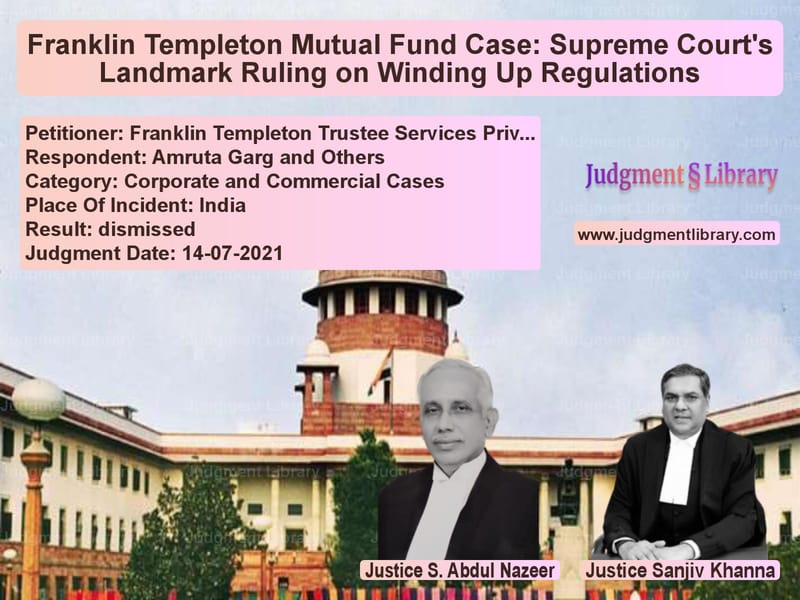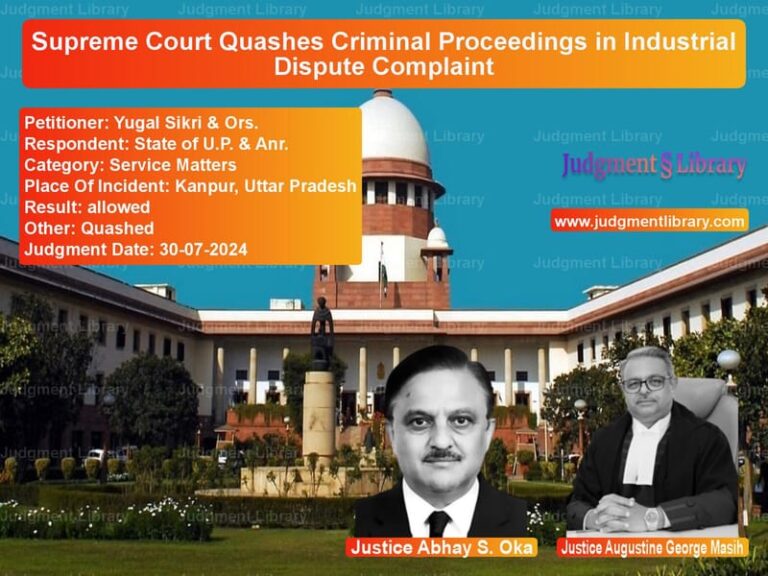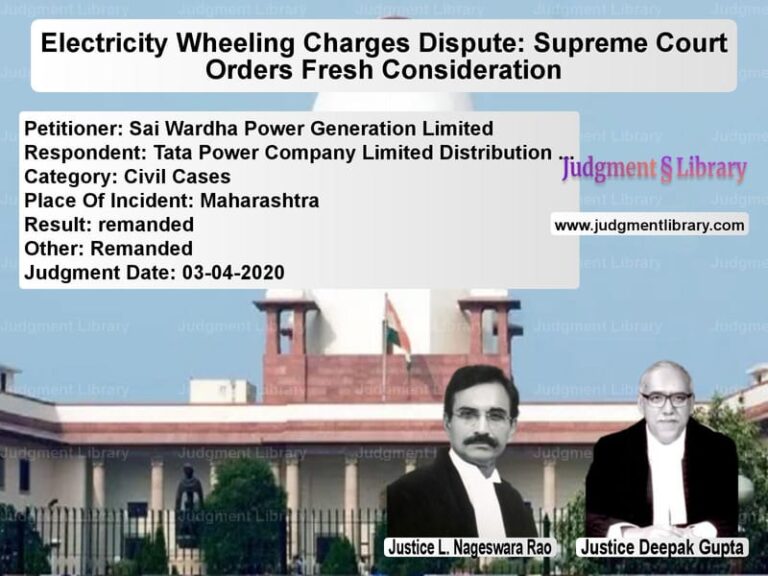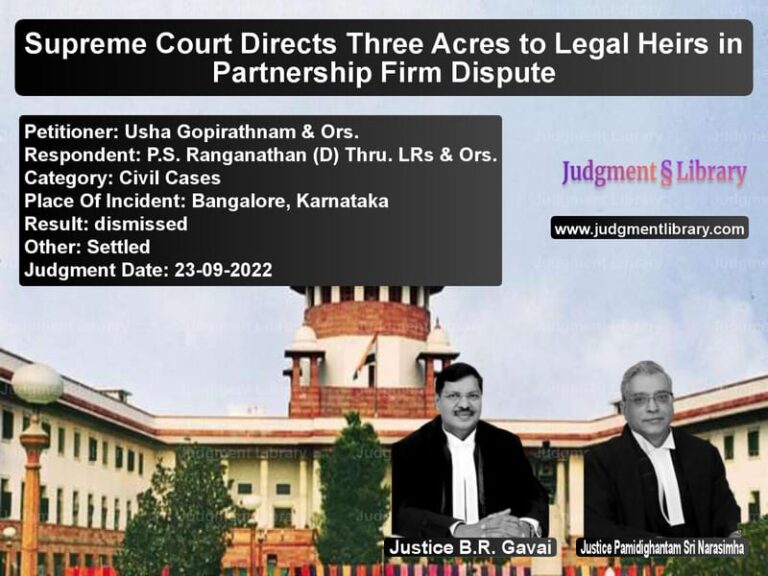Franklin Templeton Mutual Fund Case: Supreme Court’s Landmark Ruling on Winding Up Regulations
The recent Supreme Court judgment in the case of Franklin Templeton Trustee Services Private Limited and Another vs. Amruta Garg and Others has significant implications for the mutual fund industry in India. The case revolved around the winding up of six mutual fund schemes managed by Franklin Templeton, the interpretation of SEBI’s Mutual Funds Regulations, and the rights of unitholders.
The Supreme Court, in its detailed judgment, examined the validity of Regulations 39 to 42 of the SEBI (Mutual Funds) Regulations, 1996, and their interplay with Regulation 18(15)(c), which mandates obtaining unitholders’ consent before winding up a scheme. The Court also addressed the challenge to the constitutional validity of these regulations.
Background of the Case
Franklin Templeton, one of India’s leading asset management companies, announced the winding up of six of its debt schemes in April 2020, citing severe liquidity constraints due to market dislocation caused by the COVID-19 pandemic. The schemes affected were:
Read also: https://judgmentlibrary.com/personal-guarantors-and-insolvency-supreme-court-upholds-ibc-provisions/
- Franklin India Low Duration Fund
- Franklin India Ultra Short Bond Fund
- Franklin India Short Term Income Plan
- Franklin India Credit Risk Fund
- Franklin India Dynamic Accrual Fund
- Franklin India Income Opportunities Fund
The decision led to widespread concerns among investors, who questioned the legality of the closure and sought redressal. The case eventually reached the Supreme Court, which had to decide whether Franklin Templeton’s decision was in compliance with SEBI regulations and whether unitholders’ consent was required for such a move.
Key Legal Issues
- Interpretation of Regulations 39 to 42 of SEBI’s Mutual Funds Regulations.
- Whether unitholders’ consent under Regulation 18(15)(c) is mandatory before winding up a scheme.
- Whether SEBI had a role in overseeing the decision.
- Challenge to the constitutional validity of SEBI’s regulations on winding up mutual funds.
Supreme Court’s Observations and Judgment
Requirement of Unitholders’ Consent
The Supreme Court ruled that consent of unitholders is a necessary pre-condition for the winding up of a scheme by the trustees under Regulation 39(2)(a). The Court stated:
“Regulation 18(15)(c) mandates that the trustees shall obtain the consent of the unitholders when the majority of the trustees decide to wind up or prematurely redeem the units.”
The Court rejected Franklin Templeton’s argument that trustees could unilaterally decide to wind up the schemes without unitholders’ approval. It clarified that:
“Consent means the majority of unitholders present and voting. If the majority does not approve, the scheme cannot be wound up.”
Role of SEBI
The Supreme Court also addressed SEBI’s role, holding that SEBI had extensive powers to regulate mutual funds but could not interfere with the trustees’ decision unless there was a violation of regulations. It stated:
“SEBI has the authority to conduct inquiries and investigations under Sections 11 and 11B of the SEBI Act if it finds that the trustees have acted contrary to regulations or in an arbitrary manner.”
Constitutional Validity of SEBI’s Regulations
The petitioners argued that Regulation 39(2)(a) gave excessive power to trustees without clear guidelines. However, the Court upheld its validity, stating:
“The regulations provide adequate safeguards, including the requirement of unitholders’ consent, to ensure that trustees do not act arbitrarily.”
Impact on Mutual Fund Investors
This ruling has far-reaching consequences for mutual fund investors in India. The judgment reinforces the rights of unitholders and ensures transparency in the functioning of mutual funds. It also mandates that asset management companies and trustees act in the best interests of investors and obtain their consent before making critical decisions such as winding up schemes.
Conclusion
The Supreme Court’s ruling in the Franklin Templeton case strengthens investor protection in the mutual fund sector. It sets a precedent that unitholders must have a say in key decisions affecting their investments, thereby ensuring greater accountability from asset managers and trustees. The decision also clarifies SEBI’s role in regulating mutual funds while respecting the autonomy of trustees within the framework of the law.
Petitioner Name: Franklin Templeton Trustee Services Private Limited and Another.Respondent Name: Amruta Garg and Others.Judgment By: Justice S. Abdul Nazeer, Justice Sanjiv Khanna.Place Of Incident: India.Judgment Date: 14-07-2021.
Don’t miss out on the full details! Download the complete judgment in PDF format below and gain valuable insights instantly!
Download Judgment: franklin-templeton-t-vs-amruta-garg-and-othe-supreme-court-of-india-judgment-dated-14-07-2021.pdf
Directly Download Judgment: Directly download this Judgment
See all petitions in Company Law
See all petitions in Corporate Governance
See all petitions in Shareholder Disputes
See all petitions in Bankruptcy and Insolvency
See all petitions in Corporate Compliance
See all petitions in Judgment by S. Abdul Nazeer
See all petitions in Judgment by Sanjiv Khanna
See all petitions in dismissed
See all petitions in supreme court of India judgments July 2021
See all petitions in 2021 judgments
See all posts in Corporate and Commercial Cases Category
See all allowed petitions in Corporate and Commercial Cases Category
See all Dismissed petitions in Corporate and Commercial Cases Category
See all partially allowed petitions in Corporate and Commercial Cases Category







